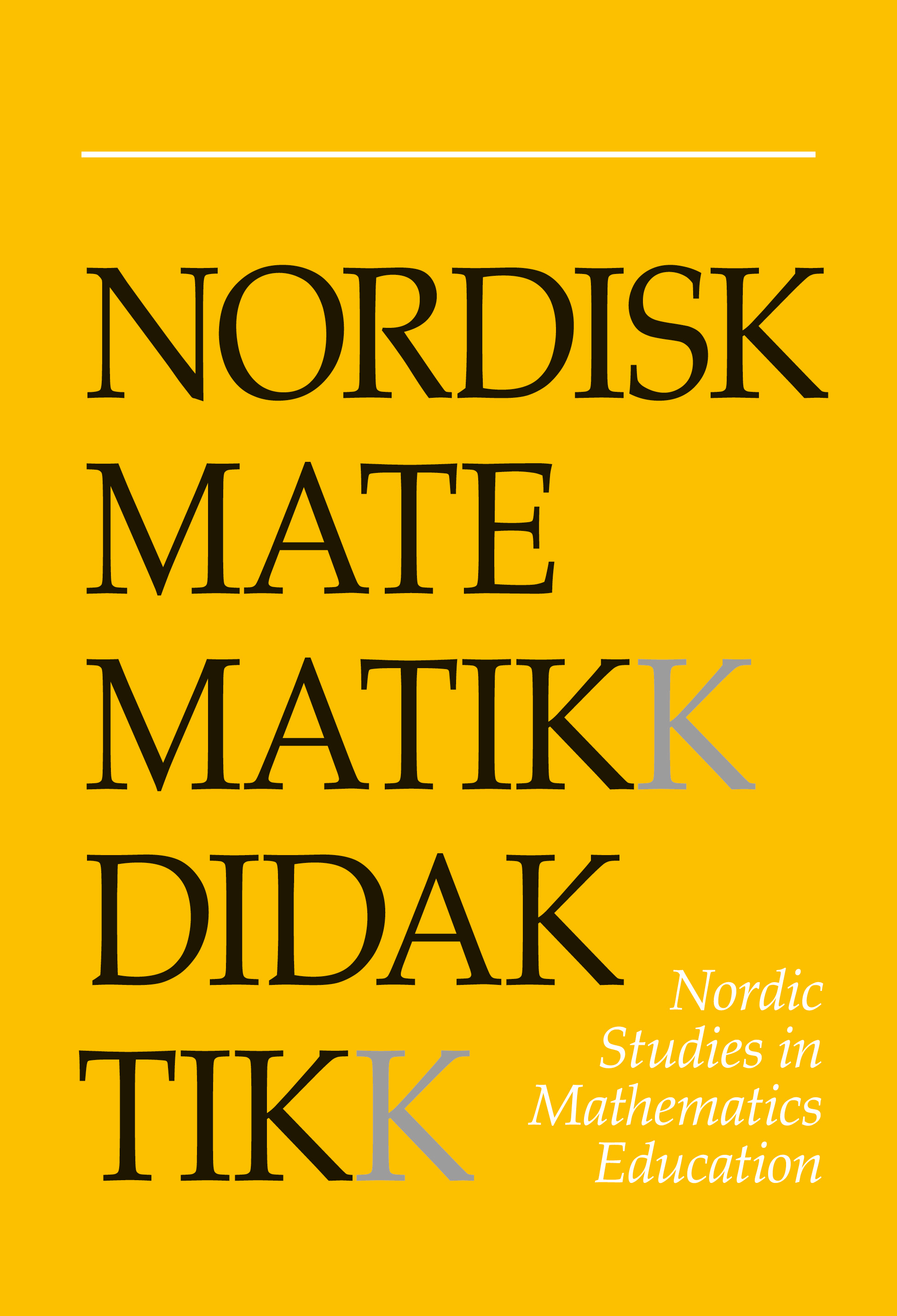Methods and key findings in research on conversations in early years mathematics: a review of the literature
DOI:
https://doi.org/10.7146/nomad.v27i3.149237Abstract
This qualitative systematic review aims to provide insight into applied research methods and key findings in early years mathematical communication research. This literature review focuses on newly published research reporting on young pupils’ (age 5 to 10) mathematical communication and reasoning. Reporting on 13 studies published between 2016 and 2020, the review found video-recordings as a favourable method for data collection, given its ability to capture verbal and non-verbal communication. Another finding was that implementing classroom norms or rules for conversation could be useful for children learning to communicate productively. The review also reports on several tools for teachers to improve practice related to conversations and mathematical reasoning.
References
Alexander, R. (2018). Developing dialogic teaching: genesis, process, trial. Research Papers in Education, 33 (5), 561-598. https://doi.org/10.1080/02671522.2018.1481140
Arias de Sanchez, G., Gabriel, M. A., Anderson, A. & Turnbull, M. (2018). Code-switching explorations in teaching early number sense. Education Sciences, 8 (1), 38. https://doi.org/10.3390/educsci8010038
Batista, L. N. & Chapin, S. H. (2019). Creating a discourse community. Teaching Children Mathematics, 25 (5), 298-304. https://doi.org/10.5951/teacchilmath.25.5.0298
Bragg, L. A., Herbert, S., Loong, E. Y.-K., Vale, C. & Widjaja, W. (2016). Primary teachers notice the impact of language on children's mathematical reasoning. Mathematics Education Research Journal, 28 (4), 523-544. https://doi.org/10.1007/s13394-016-0178-y
Braun, V. & Clarke, V. (2006). Using thematic analysis in psychology. Qualitative Research in Psychology, 3 (2), 77-101. https://doi.org/10.1191/1478088706qp063oa
Cohen, L., Manion, L. & Morrison, K. (2018). Research methods in education (8 ed., Vol. 1). Routledge. https://doi.org/10.4324/9781315456539
Coppola, C., Mollo, M. & Pacelli, T. (2019). The worlds' game: collective language manipulation as a space to develop logical abilities in a primary school classroom. European Journal of Psychology of Education, 34 (4), 783-799. https://doi.org/10.1007/s10212-018-0401-1
Dahl, H., Klemp, T. & Nilssen, V. L. (2017). Collaborative talk in mathematics - contrasting examples from third graders. https://doi.org/10.1080/03004279.2017.1336563
Grant, M. & Booth, A. (2009). A typology of reviews: an analysis of 14 review types and associated methologies. Health Information and Libraries Journal, 26, 91-108. https://doi.org/10.1111/j.1471-1842.2009.00848.x
Howe, C. & Abedin, M. (2013). Classroom dialogue: a systematic review across four decades of research. Cambridge Journal of Education, 43 (3). https://doi.org/10.1080/0305764X.2013.786024
Howe, C. & Mercer, N. (2007). Children's social development, peer interaction and classroom learning [Primary review]. University of Cambridge.
Hunter, J. (2017). Developing interactive mathematical talk: investigating student perceptions and accounts of mathematical reasoning in a changing classroom context. Cambridge Journal of Education, 47 (4), 475-492. https://doi.org/10.1080/0305764X.2016.1195789
Kitchenham, B. (2004). Procedures for performing systematic reviews. Keele University.
Klemp, T. (2019). Early mathematics - teacher communication supporting the pupil's agency. Education 3-13, 48 (7), 1-14. https://doi.org/10.1080/03004279.2019.1663893
Mercer, N. & Littleton, K. (2007). Dialogue and the development of children's thinking: a sociocultural approach. Routledge. https://doi.org/10.4324/9780203946657
Mercer, N. & Sams, C. (2006). Teaching children how to use language to solve maths problems. Language and Education, 20 (6), 507-528. https://doi.org/10.2167/le678.0
Moffett, P. & Eaton, P. (2018). The impact of the promoting early number talk project on the development of abstract representation in mathematics. European Early Childhood Education Research Journal, 26 (4), 547-561. https://doi.org/10.1080/1350293X.2018.1487166
Muhonen, H., Rasku-Puttonen, H., Pakarinen, E., Poikkeus, A.-M. & Lerkkanen, M.-K. (2016). Scaffolding through dialogic teaching in early school classrooms. Teaching and Teacher Education, 55, 143-154. https://doi.org/10.1016/j.tate.2016.01.007
Muhonen, H., Verma, P., Suchodoletz, A. von & Rasku-Puttonen, H. (2020). Exploring types of educational classroom talk in early childhood education centres. Research Papers in Education, 1-22. https://doi.org/10.1080/02671522.2020.1784259
Nordin, A.-K. & Boistrup, L. B. (2018). A framework for identifying mathematical arguments as supported claims created in day-to-day classroom interactions. The Journal of Mathematical Behavior, 51, 15-27. https://doi.org/10.1016/j.jmathb.2018.06.005
Palmér, H. & Bommel, J. van (2020). Young students posing problem-solving tasks: What does posing a similar task imply to students? ZDM, 52, 743-752. https://doi.org/10.1007/s11858-020-01129-x
Patterson, E. W. (2018). Exploratory talk in the early years: analysing exploratory talk in collaborative group activities involving younger learners. Education 3-13, 46 (3), 264-276. https://doi.org/10.1080/03004279.2016.1243141
Randolph, J. (2009). A guide to writing the dissertation literature review. Practical Assessment, Research, and Evaluation, 14 (1), 13.
Rojas-Drummond, S. & Zapata, M. P. (2004). Exploratory talk, argumentation and reasoning in Mexican primary school children. Language and Education, 18 (6), 539-557. https://doi.org/10.1080/09500780408666900
Säljö, R. (2009). Læring i praksis - et sosiokulturelt perspektiv (Vol. 8). JW Cappelens forlag.
Sidenvall, J. (2019). Literature review of mathematics teaching design for problem solving and reasoning. Nordic Studies in Mathematics Education, 24 (1), 51-74.
Smith, J. M. & Mancy, R. (2018). Exploring the relationship between metacognitive and collaborative talk during group mathematical problem- solving - What do we mean by collaborative metacognition? Research in Mathematics Education, 20 (1), 14-36. https://doi.org/10.1080/14794802.2017.1410215
Theobald, M. & Kultti, A. (2012). Investigating child participation in the everyday talk of a teacher and children in a preparatory year. Contemporary Issues in Early Childhood, 13 (3), 210-225. https://doi.org/10.2304/ciec.2012.13.3.210
Wegerif, R. & Mercer, N. (1997). A dialogical framework for researching peer talk. Language and Education Library, 12, 49-64.
Widjaja, W., Vale, C., Herbert, S., Loong, E. Y. & Bragg, L. A. (2020). Linking comparing and contrasting, generalising and justifying: a case study of primary students' levels of justifying. Mathematics Education Research Journal, 33 (2), 321-343. https://doi.org/10.1007/s13394-019-00306-w
Downloads
Published
How to Cite
Issue
Section
License

This work is licensed under a Creative Commons Attribution-NonCommercial-ShareAlike 4.0 International License.



